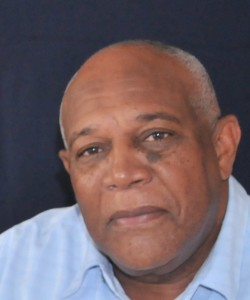
I have noticed over the past two months, on the campaign trail, candidates from both of the other parties have focused on discrediting me as Leader of the Anguilla United Front and a former Minister of Finance. They have touched on several topics to which I will respond over time as I deem it necessary — but on this occasion I will deal with two subjects: (1) the last eighteen months of our administration; and (2) the recurring subject of my pension. Since with all the challenges that we are facing on our island right now our opponents choose to be retrospective and personal, I will take time to engage them briefly.
I have taken note, however, that most of the candidates who are leading these discussions have never spent any significant time in the public service or Government — so I must forgive them for open gaps in their analysis of the dynamics of the decision-making processes in governmental systems. And I hasten to preempt their rebuttal by saying that this is not an apology for inefficiencies in those systems — indeed there is a lot in our governance culture that needs to be fixed.
I often hear the statement bandied about by politicians, and “wanna-bee” politicians, that “Government is a business”. While there is a lot of truth to that cliché, in the case of Government, the customers and the employees actually own the business. Therefore the decision-making process reflects that cumbersome ownership structure as well as the democratic management system that it demands. Neither the Chief Minister; the Governor; or the Minister has the authority of a CEO in a private business who while he/she may be answerable to the owners he/she is definitely not answerable to the customers or the employees for decisions that he/she makes. So when Managers and CEOs of private companies, especially monopolies can ignore the views of their customers (at least for a while) — representative governments cannot.
I thought it necessary to make that point because, even though I have never been Chief Minister or Governor of Anguilla, I am often treated as if I have been the CEO of Anguilla with powers that neither of these top Government Officials could hope to have. While the Government of Anguilla is run in accordance with a constitution and a set of laws — many businesses are compliant with the laws of the land, but most of their decisions are influenced by the “bottom line” or, in other words, profit maximization.
So if the CEO or Manager is making the “bottom line” look good, even at the expense of the customers and employees, they get promotions; bonuses, perks; and higher salaries. Even the philanthropy of such organizations is based on a hidden profit motive. It is in this context that I would suggest to my critics that there is a lot more to the Government than the bottom line. In fact the bottom line in Government could be looking great while the wider community is literally “catching hell”.
So boasting that we have a surplus and reserves when people are out of work; their businesses are closing down; their electricity is cut; they are losing their homes and property; they cannot pay their medical bills; their children are going to school hungry; and they are behind on their rent — is tantamount to acting like the CEO of a private business rather than a Government. Government must provide services and salaries to its people even in challenging times. No bonus; no promotion; and no perks. The only incentive we have is the gratitude of the people who elected us.
These are the same candidates who want to judge the past Government and me, as the Minister of Finance, by the economy’s performance in the last eighteen months of our term. The narrative is that the challenges of the global recession were triggered by reckless spending on our part. In other words, everything we are experiencing today is related to that period when we were spending money on infrastructure development; funding training and education for Anguillians; implementing efficiencies in the revenue collection system and governance systems as a whole; acquiring land for future social and community projects; and improving the financial situation of the public service. One critic went so far as to suggest that the salary increases granted to elective officials alone were the root cause of the recession in Anguilla.
As Minister of Finance for over fifteen years my record speaks for itself. It began in 1994 and ended in 2010 with a seven month hiatus in 1999. With the support of my colleagues and technicians in Government, throughout that period, we have always found solutions to deal with both financial and natural disasters. Because we are a small, open and vulnerable economy our projections can only be as good as the predictable factors in our assumptions. Our performance as an economy is susceptible to a whole range of external and natural shocks. Even though one can prepare for a rainy day — we certainly cannot prepare for a sudden and extended “monsoon”.
What then do the other parties mean when they say that the AUF left the Treasury empty? Do they mean that someone literally took the money out of the Treasury? If that is the case they are correct because someone does take the money out of the Treasury on a regular basis and deposits it in the bank. The Inland Revenue staff collects money from taxpayers everyday! That is the money that pays for the services we provide and the products we purchase. There is never any money sitting in the Treasury from the beginning of the year to meet these costs. It has to be collected on a daily basis from the tax measures already in place. The Budget makes projections as to how this money will be raised and from what sources. That is why it is called the Budget Estimates — they are estimated and can change and are changed during the year as things progress.
What then do the other parties mean when they say we left a seventy million dollar deficit? Do they mean that when they got into office they were seventy million dollars short and they had to find that money? No! They had no need to find that money – that money was already found by the past Government the year before. In other words, the AUF Government had already found a way to cover the shortfall. The deficit they keep talking about is only on paper because the past Government used the sixty five million dollars it had put aside for such rainy days and covered most of it. Ask yourself a question: how could this Government cover a seventy million dollar deficit when every month its own deficit was as high as four million dollars? Yet our opponents continue to spread the lie that they met a seventy million dollar deficit which they had to dispose of. I repeat: it is only a paper deficit. In fact, that is the only kind of deficit that could possibly be erased in just a matter of months. I challenge my opponents to judge the Anguilla United Front and me, as the former Minister of Finance, on our complete record — not just a convenient part.
I also feel compelled hopefully, yet another time, to address the issue of my pension as a legislator – because persons who I believe ought to know better seem to be willfully giving the impression that I am receiving something to which I am not entitled. My pension as a retired legislator is paid under the Legislator’s Pensions Act of 2004. It is the same Act that governs the pension of all retired legislators in Anguilla — not only Victor Banks. I did not compute and authorize my gratuity and pension. It was calculated by the technical officers of the Government of Anguilla assigned with that responsibility. And the legal entitlement to that pension was determined by the Ministry of Finance in conjunction with the Attorney General’s Chambers in keeping with the Act. The laws regarding my entitlement take into account all Legislators since February 10th 1976. The Father of the Nation, the Honourable James Ronald Webster; and former Chief Minister, Sir Emile R. Gumbs; all receive their pensions under the same legal provisions.
An important point that I need to establish, at the outset, is that I had absolutely no expectation that I would lose the 2010 election so any speculation that I created legislation to enhance my pension is based on a seriously flawed premise. Secondly, if I become a legislator in the future, based on the said Act, my pension will cease during the period that I am receiving my allowance as a legislator. Thirdly, my decision to vie for political office after having retired as a legislator, is anticipated in the Legislation by virtue of the fact that provision is made in the event that anyone makes such a decision.
The circumstances under which a pension shall be paid is clearly outlined in Section 4 of the Act as follows: “The person has a) served as a legislator for not less than ten year; b) has ceased to be a legislator; c) has attained the age of 55 years if he was a legislator before the act came into operation and 60 years after the act came into operation. d) not having attained the retirement of 55 or 60 becomes medically boarded and unable to discharge the duties of a legislator or any other gainful employment.”
Section 6 of the Act deals specifically with the question that is being raised as to whether if I were to be reelected I would get both pension and allowance as a legislator. That section emphatically states: “A pension payable under this Act shall, if the person in receipt thereof again becomes a legislator, cease to be payable during the period in respect of which that person is in receipt of an allowance as a legislator, but if the amount of such basic allowance is less than the amount of pension, the higher amount is payable.”
The same persons who take to the platform and readily state the pension and gratuity compensations paid to former legislators – could have just as easily read the Legislators Pension Act and confirmed what happens after a legislator is reelected. Obviously, such knowledge would not paint the desired picture of a greedy legislator coming up with a scheme to receive both payments. And while they were on their feet they could also have taken the opportunity to speak about “golden handshakes”; bonuses; perks; and “redundancy packages”. What is interesting, though, is that if elected you all will continue to receive any pensions that you are now receiving from the private sector. May be that’s why you so readily volunteer to cut your salaries in half.
So let me set the record straight in terms of my entitlement:
1. I am no longer a legislator so I am entitled to a pension since I am eligible. I am a retired legislator not a retired politician.
2. Not only have I served the required ten (10) years as a legislator. I actually served twenty-eight years as a legislator.
3. I was entitled to retirement at the age of 55. I actually retired at the age of 62.
4. My pension and gratuity were computed in accordance with the provisions of the Legislations Pensions Act as amended in 2004.
So, in a nutshell, the past Government did not leave the Treasury empty with a deficit that the AUM has successfully paid off in three months. And I am fully entitled to my pension as a retired legislator until I have been successfully reelected. What could be clearer than that?








